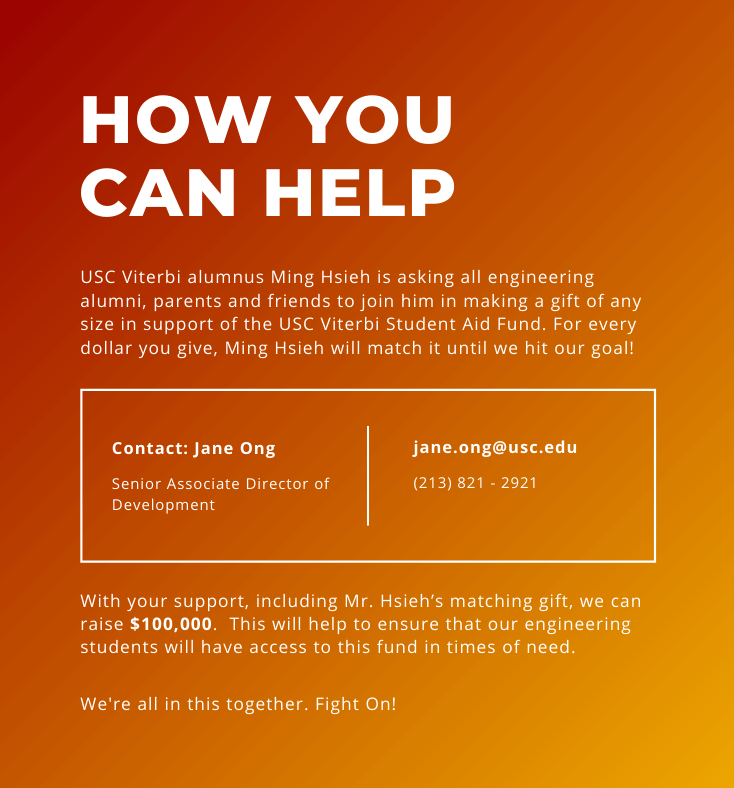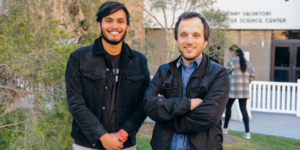
A USC Viterbi engineering student on campus before the pandemic. (Photo/Noe Montes)
Just a few months ago, Jingcheng Wen was enjoying life as an international graduate student in one of the most vibrant cities on earth.
“The large community of international students in L.A. made life easier,” said Wen who is studying for a master’s in computer science at USC Viterbi.
There was church service every Friday, outings with classmates, concerts, game nights, and events put on by student organizations – all part of the everyday slice of life that made Wen feel more at home and campus like a mini United Nations.
“We had so many choices in activities, I wouldn’t have time in my schedule to fit them all,” he said.
But when everything came to a grinding halt, it left students and university administrators racing to find ways to come to the aid of students who were severely impacted by the crisis. Enter the Trojan family.
Shortly after COVID-19 forced a complete lockdown of Los Angeles, USC Viterbi alumni responded by creating the Emergency Student Relief Fund. As of this writing, the fund has awarded over $66,000 to 101 domestic and international students. It is unique to USC Viterbi and helps students cover basic needs such as housing, food and computer equipment as they continue their studies remotely.
“This is a moment where the true nature of the Trojan family is revealed – it is one of the most generous, empathetic communities in the nation,” said Mary Ann Schwartz, senior associate dean of advancement at USC Viterbi. “The support of our alumni and friends are now directly easing the financial burdens of well over 100 students. It has the potential to reach far more.”
Wen now jogs alone around USC campus and ponders the memories that made his Trojan experience: “It all feels so empty now.” But the challenges faced by international students go beyond the lack of social interaction.
“The emergency fund made us feel that the alumni really care about international students.”
Jingcheng Wen
On July 6, the U.S. Immigration and Customs Enforcement released a rule that would have prohibited the over 16,000 foreign students enrolled at USC from entering or remaining in the country to take fully online course loads. It caused a nationwide backlash from American colleges and universities, including USC, which sued the U.S. government in federal court just days later. In a swift reversal, the federal government agreed to rescind its directive.
Without an internship for the summer, Wen was planning to return home to China to an uncertain future, but a search for a return ticket yielded a shock: “What was once a $700 flight to Beijing turned out to be more than $2,000,” he said. “No way I could afford that.”
Like many others, Wen found himself scrambling from chat room to chat room to find housing in and around campus.
The Emergency Student Relief Fund came just in time.
“It helped me cover rent for one month on campus in the most critical time,” said Wen, who now shares an apartment near campus with another USC international student who gave him a room rent free. “The emergency fund made us feel that the alumni really care about international students.”
Wen also relies on the university’s emergency meal plan which provides him seven meals per week. “Without this assistance, I don’t know how I would’ve been able to survive in Los Angeles,” he said.
Kaveh Dehghani, M.S. ’77, Ph.D. ’83, remembers the feeling all too well. In 1979, Dehghani, then an international doctoral student, was suddenly cut off from all the support he was receiving from Iran due to the Iranian Revolution and the hostage crisis unfolding in his native country.
“I had to survive on a small student stipend USC was kind enough to give me,” said Dehghani, who was one of the first alumni to contribute to the student emergency fund. “To add to the challenges, Iranian students didn’t have a positive image in the U.S. although we had nothing to do with the politics back home. We were here to study and contribute to the scientific community, so in many ways I empathize with our students who are caught up in a crisis through no fault of their own.”
Dehghani, who leads a team of reservoir engineers at Chevron was so encouraged by the response from USC Viterbi alumni that he convinced Chevron to match his gift. He hopes that this can truly be a lifeline to the students who cannot leave campus in this time.
Others, like Sam Kaur — whose name was changed at his request — unfortunately don’t have the choice to live near campus.
A junior in USC Viterbi’s information technology program (ITP), and a first-generation college student, Kaur lives in Orange County and has always been a commuter student. Life on campus meant traveling two to three hours a day to get to class.
“There was simply no time for social life or extracurricular involvements,” Kaur said. When Kaur’s mother was laid off from a service job at the onset of the lockdown, Kaur and his mother were forced to find more affordable rent.
Then, his 2012 MacBook on which he was relying to complete his coursework began to crash on him.
“It only had 4 GB of RAM and it couldn’t be upgraded,” Kaur said. “I had to take an incomplete grade in my Java class because my computer literally could not handle running Eclipse and Zoom at the same time.”
He applied for the Emergency Student Fund for a new computer and went out on a whim purchasing a new MacBook Air on a credit card until the emergency funds came through.
“Lots of students are struggling financially,” he said. “Meanwhile financial aid packages are shrinking so initiatives like Viterbi’s Emergency Relief Fund are imperative to close the gap. I hope we can create more of these emergency funds.”
USC Viterbi alumnus and university trustee Ming Hsieh, B.S. EE ’83, M.S. EE ’84, agrees. The one-time international student, and now a billionaire entrepreneur and philanthropist, has pledged to match an additional $50,000 raised for the Viterbi Student Emergency Relief Fund.
“Education is the great equalizer that can allow anyone from any background to achieve their dreams,” Hsieh said. “That is why we cannot allow Covid to disrupt the journeys of these students. Investing in them means investing in our ability to bounce back from this pandemic as a society and as one Trojan family.”
Published on August 3rd, 2020
Last updated on October 2nd, 2024














